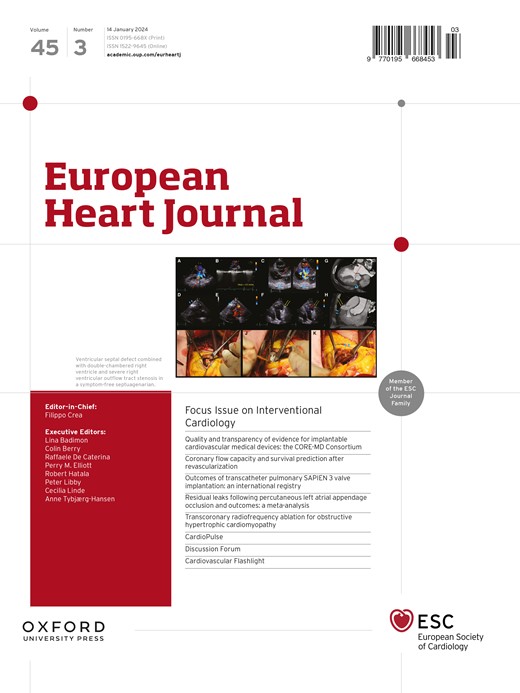Amyloid beta, a marker of vascular aging and cardiovascular disease, is associated with accelerated progression of renal dysfunction
IF 37.6
1区 医学
Q1 CARDIAC & CARDIOVASCULAR SYSTEMS
引用次数: 0
Abstract
Background Amyloid-beta (1-40) (Αb1-40), a proinflammatory and pro-atherosclerotic peptide, is involved in Alzheimmer’s disease and vascular aging and is considered an emerging prognostic marker of atherosclerotic cardiovascular disease (ASCVD) and heart failure. Because Ab1-40 clearance is largely dependent on renal function while clinical data consistently associate this peptide with renal function, we hypothesized that Ab1-40 circulating levels would serve as a predictor of progression of renal dysfunction. Purpose To examine the potential cross-sectional and prospective bidirectional association of Ab1-40 levels with renal function in a population with a wide range of ASCVD risk. Methods In the settings of the Athens Cardiometabolic registry, data from consecutively recruited subjects with (n=137) and without clinically overt ASCVD (n=674) with available both Ab1-40 plasma levels and GFR values (total n=811) were analyzed. Αb1-40 was measured by enzyme-linked immunosorbent assay and renal function was assessed by estimation of glomerular filtration rate (GFR). Of these subjects, 182 individuals consented to be followed up and re-assessed after a minimum period of 12 months in order to examine a potential bidirectional link between changes in Ab1-40 levels and GFR. Results Patients with increased Ab1-40 levels at baseline had significantly worse renal function, reflected as lower GFR values, compared with their counterparts with lower Ab1-40 levels (GFR= 74.8 vs 93.3 vs 100.2 ml/min/1.73m2 for high, middle and low tertile of Ab1-40 levels, p<0.001). Elevated Ab1-40 levels were associated with chronic kidney disease (CKD) stage 2 [odds ratio (OR)=2.29, 95% confidence intervals (CI)= 1.58-3.31, p<0.001] and CKD stage 3 (OR=3.67, 95% CI=2.37-5.70, p<0.001) at baseline. Furthermore, increased Ab1-40 at baseline was prospectively associated with accelerated progression of renal dysfunction as assessed by changes in GFR values between baseline and follow-up [mean adjusted rate of decrease=-7.20 (95% CI=-1.33, -13.07) for higher vs lowest tertiles of Ab1-40 levels across a follow-up period of 12 months, p=0.017 for interaction). On the contrary, baseline GFR values were not prospectively associated with Ab1-40 levels at follow-up visits (p>0.05). Conclusion In a population with a wide range of ASCVD risk, high Αb1-40 levels at baseline were associated both with renal function at baseline and with accelerated rate of progression of GFR deterioration at follow-up irrespective of its baseline levels. These findings suggest a mechanistic background for the established association of Ab1-40 with renal function and warrant further research to clarify the clinical value of monitoring its circulating levels as a novel biomarker which could reflect enhanced risk for renal dysfunction.血管老化和心血管疾病的标志物淀粉样蛋白 beta 与肾功能障碍的加速发展有关
背景 淀粉样蛋白-β (1-40) (Αb1-40)是一种促炎症和促动脉粥样硬化肽,与阿尔茨海默病和血管老化有关,被认为是动脉粥样硬化性心血管疾病 (ASCVD) 和心力衰竭的新兴预后标志物。由于 Ab1-40 的清除率在很大程度上取决于肾功能,而临床数据一直将该肽与肾功能联系在一起,因此我们假设 Ab1-40 循环水平可作为肾功能障碍进展的预测指标。目的 在具有各种 ASCVD 风险的人群中,研究 Ab1-40 水平与肾功能之间潜在的横断面和前瞻性双向关联。方法 在雅典心脏代谢登记处的背景下,对连续招募的患有(n=137)和未患有(n=674)临床明显的 ASCVD 的受试者的数据进行分析,这些受试者同时具有 Ab1-40 血浆水平和 GFR 值(总计 n=811)。Αb1-40通过酶联免疫吸附测定法进行测量,肾功能通过估算肾小球滤过率(GFR)进行评估。在这些受试者中,有 182 人同意在至少 12 个月后接受随访和重新评估,以研究 Ab1-40 水平变化与肾小球滤过率之间的潜在双向联系。结果 与 Ab1-40 水平较低的患者相比,基线时 Ab1-40 水平升高的患者肾功能明显较差,表现为 GFR 值较低 (GFR= 74.8 vs 93.3 vs 100.2 ml/min/1.73m2 for high, middle and low tertile of Ab1-40 levels, p<0.001)。Ab1-40 水平升高与基线时的慢性肾脏病(CKD)2 期[几率比(OR)=2.29,95% 置信区间(CI)=1.58-3.31,p<0.001]和 CKD 3 期(OR=3.67,95% CI=2.37-5.70,p<0.001)有关。此外,根据基线与随访期间 GFR 值的变化评估,基线时 Ab1-40 水平的升高与肾功能障碍的加速进展具有前瞻性关联[随访 12 个月期间,Ab1-40 水平较高与较低三分位数的平均调整下降率=-7.20(95% CI=-1.33,-13.07),交互作用 p=0.017]。相反,基线 GFR 值与随访时的 Ab1-40 水平没有前瞻性关联(p>0.05)。结论 在具有广泛 ASCVD 风险的人群中,基线时的高Αb1-40 水平既与基线时的肾功能有关,也与随访时 GFR 恶化速度加快有关,而与基线水平无关。这些发现提示了Ab1-40与肾功能关联的机理背景,值得进一步研究,以明确监测其循环水平作为一种新型生物标志物的临床价值,这种生物标志物可反映肾功能障碍风险的增加。
本文章由计算机程序翻译,如有差异,请以英文原文为准。
求助全文
约1分钟内获得全文
求助全文
来源期刊

European Heart Journal
医学-心血管系统
CiteScore
39.30
自引率
6.90%
发文量
3942
审稿时长
1 months
期刊介绍:
The European Heart Journal is a renowned international journal that focuses on cardiovascular medicine. It is published weekly and is the official journal of the European Society of Cardiology. This peer-reviewed journal is committed to publishing high-quality clinical and scientific material pertaining to all aspects of cardiovascular medicine. It covers a diverse range of topics including research findings, technical evaluations, and reviews. Moreover, the journal serves as a platform for the exchange of information and discussions on various aspects of cardiovascular medicine, including educational matters.
In addition to original papers on cardiovascular medicine and surgery, the European Heart Journal also presents reviews, clinical perspectives, ESC Guidelines, and editorial articles that highlight recent advancements in cardiology. Additionally, the journal actively encourages readers to share their thoughts and opinions through correspondence.
 求助内容:
求助内容: 应助结果提醒方式:
应助结果提醒方式:


